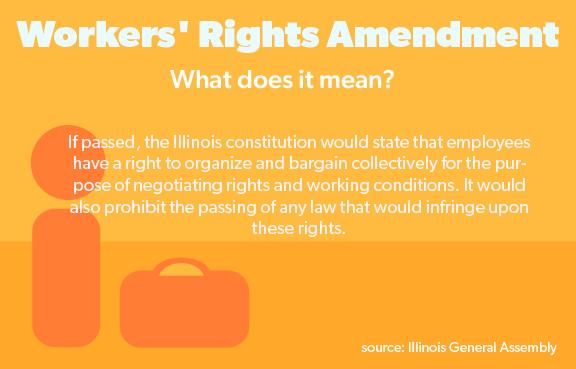Understanding your ballot: the Workers’ Rights Amendment
Nov 3, 2022
On Nov. 8, Illinois residents have the opportunity to vote in the midterm elections. One issue appearing on Illinois’ ballots this year concerns the Illinois Right to Collective Bargaining Measure, which is more commonly known as the Workers’ Rights Amendment.
This proposed amendment to the state constitution, according to the Illinois General Assembly website, would ensure workers the right to organize and to select individuals to negotiate working conditions on their behalf. Furthermore, the amendment would codify the right to collective bargaining into Illinois law.
In 2021, the amendment passed both the Illinois house (80-30) and senate (49-7) with support from both Democratic and Republican politicians.
The referendum is endorsed by unions across the state.
Nachiketa Adhikari, graduate student studying mathematics and co-president of the Graduate Employees’ Organization at the University, said that the proposed amendment, if passed, would prevent future elected officials from passing legislation that would interfere with union rights.
Get The Daily Illini in your inbox!
“The measure would enshrine workers’ rights to organize into the Illinois constitution,” Adhikari said. “In other states, lawmakers have taken away workers’ rights to organize through (legislation). Many unions there no longer have the right to bargain collectively.”
In 2011, Scott Walker, the governor of Wisconsin at the time, signed into law a bill that restricts collective bargaining for general municipal employees.
A frequent opposition to the amendment is its potential to impact prices for goods and services and raise taxes. But, Adhikari said that this point is misunderstood.
“A common talking point from critics is that these protections will raise taxes or raise costs,” Adhikari said. “What they don’t realize is that workers and their families are often the ones paying for things. When workers have higher wages and better benefits, it makes life easier for all of us.”
A paper written by Mailee Smith, the director of labor policy at the Illinois Policy Institute, a libertarian think tank and Perry Zhao, an IPI policy intern, challenges the measure by stating that, as written, it could allow for more freedoms than intended.
“The language of Amendment 1 is so broad and vague it’s hard to predict every potential state law or local ordinance that could be trumped by a union contract,” the paper states. “Amendment 1 would allow government unions to pass their most unpopular demands at the bargaining table.”
Dian Palmer, president of Service Employees International Union Local 73, experienced the effects of anti-union laws firsthand in her home state of Wisconsin. Palmer urges Illinoisans to vote ‘yes’ on the amendment to avoid repeating the effects.
“We didn’t have legislation like this in place,” Palmer said. “We were alright for, like, 50 years. Then, we got a group of legislators who went out against us. We lost our union. I was a state worker, and I lost my ability to be represented by the union. That happened in 2010, and since then, people have been fighting to get those rights back.”
Palmer said that leaving workers completely without protections could lead to politicians targeting them with anti-union laws.
“This amendment would solidify our ability to have an effective union in our workplace,” Palmer said. “If the measure passes, we won’t be subject to the whims of legislators.”
Palmer said that without ironclad union protections, politicians could target workers with potentially harmful legislation.
“The amendment would protect all workers who speak out against working conditions,” Palmer said. “From food safety issues to shoddy construction, this would allow us to lift our voices without fear.”






